【优质】小学英语科普版五年级下册Lesson 9 Do you always have lunch at twelve 优质公开课教案1
科普版英语五年级下 Lesson9 第四课时
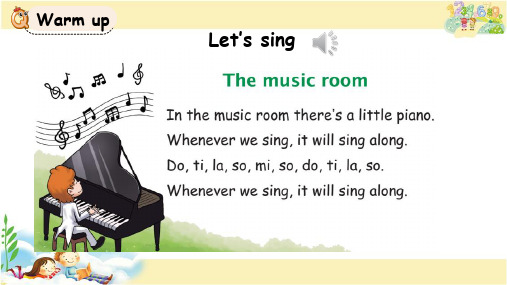
I usually get up at 6:30, but now it’s 8:00. It’s time for school. I’m late.
I always do morning exercises at 7:10, but today I have no time. do morning exercises
work 运行;运转
Read after the tape. Is he late?
I usually get up at 6:30, but now it’s 8:00. It’s time for school. I’m late.
I always do morning exercises at 7:10, but today I have no time.
张的早上。
Homework
one
two
听录音,七跟彩读 课堂课外读一读
课文,并伴尝你试 成长其他故事,
复述课文。
并与同学分
享。
o’clock. He usually has _s_ou_p_and _r_ic_e_.
二、单项选择。
( A )1.The clock in my room isn’t _____.
A. working
B. work
( B )2.She isn’t in the room. She isn’t in the
bedroom 卧室
This is my bedroom. 这是我的卧室。
toilet 厕所
May I use your toilet. 我能用下你的厕所吗?
early 早的
I’m early for school. 我今天到校很早。
五年级英语下册Lesson9《Doyoualwayshavelunchattwelve》 精选教学PPT课件2科普版
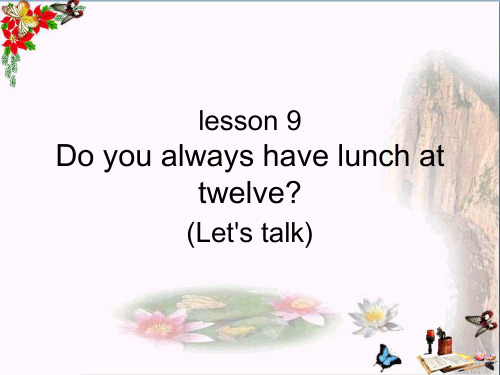
• What about Tom ?He _____ has lunch at _______ . __________ he has lunch at12:00.What does he usually have lunch? _______,________ and _______ .
拓展运用 talk and write, eg: Lulu,Do you usually have ...at...? What do you have for ...?
Name
Breakfast time Food/Drink
Lu lu Tom
7:00 6:50
bread / milk egg / milk
又回到了这个让我倍感孤独的城市,我的日子也回到从前的单调无味。 其实我并不希望这么孤单的活着, 我渴望温柔的疼爱, 我渴望被身边的人喜欢。 我拒绝被不能忍受的忽略陪伴着,
我更厌倦了那些人嘲笑我的自哀自怜, 甚至有很多时候,我分辨不清人心的真伪。
然而, 他们离去了,我却又这样的不情愿。 世界上的一切人或事都是容易被轻易遗忘的。 没有什么可以永垂不朽,没有什么是永远不能失去的。
li语励志名言
• Never pet off what you can do today until tomorrow.(今日事,今日毕!)
• Nothing is impossiball.(没有什么不可能。)
我静静的站在角落里,看着这个世界,看着来来往往的人群。 每个人都步履匆匆的从我的身边走过,渐行渐远。
五年级英语下册Lesson9《Doyoualwayshavelunchattwelve》 精品优选PPY课件2科普版

善待自己,叫自己开心一些快乐一些! 这样我门会幸福,我们幸福了,最爱的人同样也幸福! 即使容颜不在,请用我门纯洁的心灵将灿烂崇拜!让世界拥有它的脚步,让我保有我的茧。当溃烂已极的心灵再不想作一丝一毫的思索时,就让我静静的回到我的茧内,以回忆为睡榻,以悲哀为覆被。这是我唯一的美丽。
拓展运用 talk and write, eg: Lulu,Do you usually have ...at...? What do you have for ...?
Name
Breakfast time Food/Drink
Lu lu Tom
7:00 6:50
bread / milk egg / milk
不在让等待换成沉默的悲哀不要让守望在无声的叹息里走象溃烂 如果可以
不要在为遥远的距离莫名的伤感…… 不要用一贯的悲喜左右着脆弱的情怀。 如果只是如果,我门谁都回不到过去,谁都无法重新来过! 虽然我们无法更改过,但我们可以掌握未来!
从现在起! 历经沧桑的我门不要在做漂浮的花瓣! 不要用艳红的麻痹去撰写茫然的灰暗! 不要在蹉跎我们已经流失的青春岁月!
我含笑躺下,摊开偷回来的记忆,一一捡点。也许,是知道自己的时间不多,也许,很宿命地直觉到终要被遣回,当我进入那缤纷的世界,便急着把人生的滋味一一尝遍。很认真,也很死心塌地。一衣一衫,都还有笑声,还有芳馨。我要仔细收藏的,毕竟得来不易。在最贴心的衣袋里,有我最珍惜的名字,我仍要每天唤几次,感觉那一丝温暖。它们全曾真心真意待着我。如今在这方黑暗的角落,怀抱着它们入睡,已是我唯一能做的报答。
科普版英语五年级下Lesson 9第二课时

问句及特殊疑七问彩句。课堂 伴你成长 Do you always have lunch at twelve?
I usually have lunch at eleven thirty. What do you usually have for lunch?
Review
What do you usually have for lunch?
bread /e/
noodles
chicken
beef
rice
soup /u:/
Presentation
Let’s learn
What time is it?
— Do you always have lunch at twelve?
二、按要求完成句子。
1.几点了? What time is it?
2.该吃午饭了。 It's time _f_o_r_ _lu_n_c_h_ . 3.你呢? What about you? 4.我经常11:30吃午饭。 I often have lunch at
eleven thirty.
Summary
Practice
— Do you always have … at… ? Breakfast
— Yes, I do./No, I don’t. — What do you usually have
for …? — I usually have …
Lunch
Dinner
Let’s do a survey
Cary Nancy Jack
…
Байду номын сангаас
Breakfast 8:00 7:00 7:30
【优质】小学英语科普版五年级下册Lesson 9 Do you always have lunch at twelve 优质公开课教案2
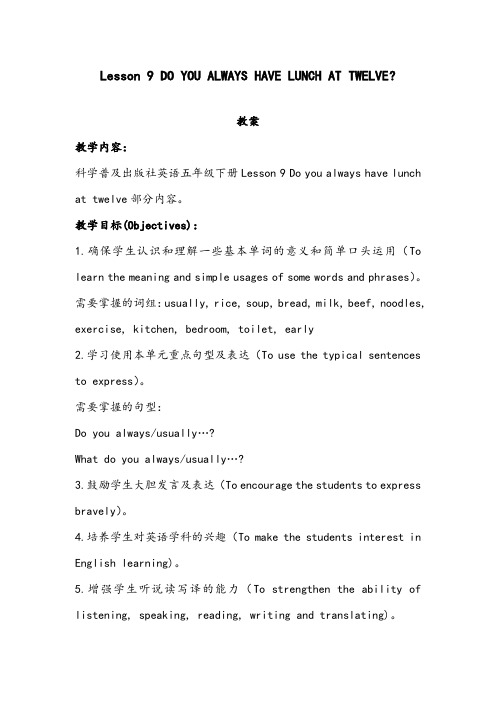
Lesson 9 DO YOU ALWAYS HAVE LUNCH AT TWELVE?教案教学内容:科学普及出版社英语五年级下册Lesson 9 Do you always have lunch at twelve部分内容。
教学目标(Objectives):1.确保学生认识和理解一些基本单词的意义和简单口头运用(To learn the meaning and simple usages of some words and phrases)。
需要掌握的词组:usually, rice, soup, bread, milk, beef, noodles, exercise, kitchen, bedroom, toilet, early2.学习使用本单元重点句型及表达(To use the typical sentences to express)。
需要掌握的句型:Do you always/usually…?What do you always/usually…?3.鼓励学生大胆发言及表达(To encourage the students to express bravely)。
4.培养学生对英语学科的兴趣(To make the students interest in English learning)。
5.增强学生听说读写译的能力(To strengthen the ability of listening, speaking, reading, writing and translating)。
教学重点(Key Points):在学习了单词的基础上,以单词为载体,进行主要句型的学习,并了解其中的语法现象,根据具体情境,学会交流对话,侧重句型语法学习,交际意向和课外拓展为重点。
教学方法:游戏,音频,情景教学法,Pair-work两人小组活动,Group-work小组活动,多媒体辅助教学。
科普版小学英语五年级下册知识整理
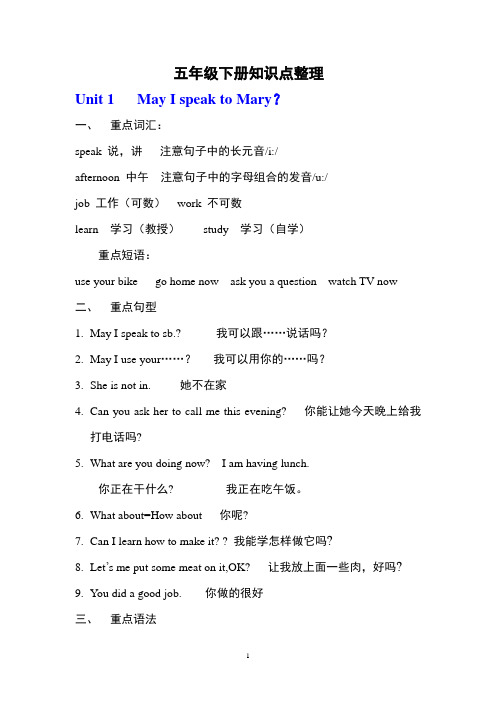
五年级下册知识点整理Unit 1 May I speak to Mary?一、重点词汇:speak 说,讲注意句子中的长元音/i:/afternoon 中午注意句子中的字母组合的发音/u:/job 工作(可数)work 不可数learn 学习(教授)study 学习(自学)重点短语:use your bike go home now ask you a question watch TV now二、重点句型1.May I speak to sb.? 我可以跟……说话吗?2.May I use your……?我可以用你的……吗?3.She is not in. 她不在家4.Can you ask her to call me this evening? 你能让她今天晚上给我打电话吗?5.What are you doing now? I am having lunch.你正在干什么? 我正在吃午饭。
6.What about=How about 你呢?7.Can I learn how to make it? ? 我能学怎样做它吗?8.Let’s me put some meat on it,OK? 让我放上面一些肉,好吗?9.You did a good job. 你做的很好三、重点语法1.情态动词can/may /must表示请求,委婉的态度,后面加动词原形2.现在进行时的用法Unit2 We mustn’t cross the street now?一、重点词汇:must 必须,后面加动词原形street 街道,注意ee字母组合answer 回答,答复cross 动词:穿过重点短语:answer the question 回答问题all right 好No left turn 不要左转left turn 左转no parking 禁止停车parking 停车No U-turn 不能转弯U-turn 转弯二、重点句型1.Are you going shopping?2.You mustn’t run in the street.3.You mustn’t cross the street here.4.You can cross the street there.5.I should give my seat to her.三、重点语法情态动词must的用法Must+动词原形......Unit3 How many pupils are there?一、重点词汇短语blackboard 黑板pupil 小学生paper 纸张hould 应该pick 捡起throw away 扔掉pick up捡起二、重点句型1. How many pupils are there in your class this term?2. There are/is 名词.3. w e have a new clock and we have some green plants.4. This make the streets and parks very dirty.5.Many of the things are useful.6.The pupils are doing a good job, and they are very happy.三、重点语法1.there be句型2.数词的用法—基数词Unit4 Where do you live?一、重点词汇live 居住town 注意发音sick 病的注意ck的发音come from 来自be ready to 愿意做某事二、重点句型1.Where do you come from?2.Where do you live?3. Where are you from?4.Why are you crying?5.He is always ready to help others.6.They walked for along time.7.The farmer took our some money.Unit 5 What do you do?一、重点词汇easy 容易的kind 和蔼的choose选择which 哪一个manager 经理interesting 有趣的二、重点句型1.What do you do?2. Where do you work?3. Is your work interesting?4. Go and find your manager.5.Now Mr. Smith knows who to choose.Unit7 It’s seven thirty-five一、重点词汇breakfast 早餐Monday 周一fifty 50 way 路try 尝试Tuesday 周二Thursday 周四Wednesday 周三fill 填满on the way 在……路上二、重点句型1.What time is school over?2. What about Monday and Wednesday ?3. What time is it?4. It’s time for school.5. On the way they see a boy.6.They try to take the ball out.7. They get some water and fill the hole with it.8. The boy smiles and thanks them for their help.三、重点语法1.数词—基数词2.时间的表示方法和提问Unit8 What day is it today?一、重点词汇math 数学art 艺术PE 体育science 科学subject 学科when 当……的时候lesson 课hope 希望soon 不久二、重点句型1.What day is it today?2.What classes do you have this morning?3.When do you have English?4.We have Chinese and PE.5.I want to make a new timetable.6.Lulu is writing an email to her now.7.Let me tell you what we did today. 8.Hope to see you soon.三、重点语法1. 星期的说法2.关于科目的单词3.关于课程的询问Unit 9 Do you always have lunch at twelve?一、重点词汇rice soup exercise kitchen toilet early bedroom usually短语:have lunch 吃午饭get up 起床do morning exercise 做晨练二、重点句型1.What time is it?2. I have to run to school.3.What do you usually have for lunch?4.I always do morning exercises at 7:10.5. Do you always have lunch at twelve?6.The clock in my room isn’t working.三、重点语法1.时间的询问2.一般疑问句和特殊疑问句Unit10 Does she always come before six thirty?一、重点词汇Before afraid stand suddenly someone get out each other二、重点句型1.Where is she today?2. Does she always come before six thirty?3.I am afraid she isn’t feeling well today.4. Suddenly they hear someone crying.5.Then they have an idea.6. They get a lot of grass and throw the grass onto the pit.三、重点语法1.一般疑问句的单三形式2.动词短语的积累Unit11. When do you usually get up?一、重点词汇far minute by slow daughter telephone ring短语by bike on foot have breakfast for a minute二、重点句型1.When do you usually get up?2. How do you usually go to school?3. Her home is not far from the school.4.What time does Peter go to school?5.How is he going?6.When so they go to bed?7.He talks to her for a minutes.8. Why are you still having breakfast?三、重点语法问时间的特殊疑问句Unit12. Revison重点句型1.What day is it taday?2.What time is it?3.When do you usually get up?4.How do you usually go to school?5.The TV is on the wall.6.When I talk to my friend on it, I can see him.7.I often use it to send emails to my friends.8.I want a machine to help me so my homework.小学二(2)班班规一、安全方面1、每天课间不能追逐打闹。
科普版小学英语五年级下册英语Lesson 9 Do you always have lunch at
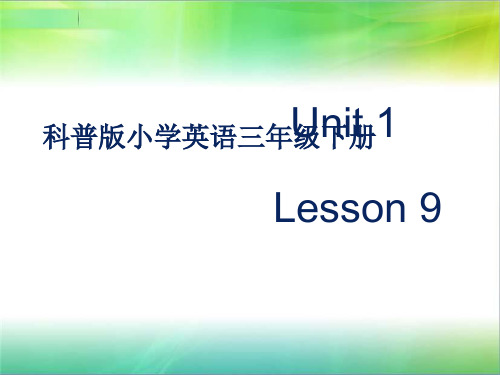
Lulu
Exercise 12:00 for lunch
Tom 11:30 for lunch
Presentation
-Do you always have lunch at twelve? -Yes, I do. -What do you usually have for lunch? -I usually have rice and beef.
L=Lulu, T=Tom Presentation
L: Do you always have lunch at twelve? T: Yes, I do. What about you?
L=Lulu, T=Tom
Presentation
L: I usually have lunch at eleven thirty. Sometimes I have lunch at twelve. T: What do you usually have for lunch? L: Rice, chicken and soup.
Presentation
A: (Are/Do) you usually drink tea? B: No, we (aren’t/don’t). We usually drink coke. A: Thank you. B: You’re welcome.
Exercise
A: I’m doing a survey. Can I ask you some questions? B: Oh, yes. A: (Are/Do) you from the UK? B: Yes, I (am/do). A: What food (are/do) you often have? B: We often have French fries.
科普版五年级英语下册教案Lesson 9 DO YOU ALWAYS HAVE LUNCH AT TWELVE教案

Lesson 9 DO YOU ALWAYS HA VE LUNCH AT TWELVE?教案教学内容:科学普及出版社英语五年级下册Lesson 9 Do you always have lunch at twelve部分内容。
教学目标(Objectives):1.确保学生认识和理解一些基本单词的意义和简单口头运用(To learn the meaning and simple usages of some words and phrases)。
需要掌握的词组:usually, rice, soup, bread, milk, beef, noodles, exercise, kitchen, bedroom, toilet, early2.学习使用本单元重点句型及表达(To use the typical sentences to express)。
需要掌握的句型:Do you always/usually…?What do you always/usually…?3.鼓励学生大胆发言及表达(To encourage the students to express bravely)。
4.培养学生对英语学科的兴趣(To make the students interest in English learning)。
5.增强学生听说读写译的能力(To strengthen the ability of listening, speaking, reading, writing and translating)。
教学重点(Key Points):在学习了单词的基础上,以单词为载体,进行主要句型的学习,并了解其中的语法现象,根据具体情境,学会交流对话,侧重句型语法学习,交际意向和课外拓展为重点。
教学方法:游戏,音频,情景教学法,Pair-work两人小组活动,Group-work小组活动,多媒体辅助教学。
科普版英语五年级下册课文(电子档)
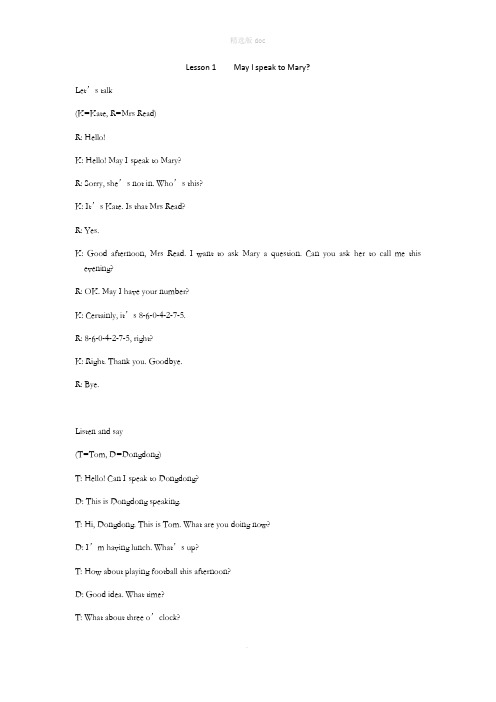
Lesson 1 May I speak to Mary?Let’s talk(K=Kate, R=Mrs Read)R: Hello!K: Hello! May I speak to Mary?R: Sorry, she’s not in. Who’s this?K: It’s Kate. Is that Mrs Read?R: Yes.K: Good afternoon, Mrs Read. I want to ask Mary a question. Can you ask her to call me this evening?R: OK. May I have your number?K: Certainly, it’s 8-6-0-4-2-7-5.R: 8-6-0-4-2-7-5, right?K: Right. Thank you. Goodbye.R: Bye.Listen and say(T=Tom, D=Dongdong)T: Hello! Can I speak to Dongdong?D: This is Dongdong speaking.T: Hi, Dongdong. This is Tom. What are you doing now?D: I’m having lunch. What’s up?T: How about playing football this afternoon?D: Good idea. What time?T: What about three o’clock?D: OK. Where shall we meet?T: At the sports centre, OK?D: OK.ReadMaking a pizzaMom, are you making a pizza? May I help you?Yes, Tom. Thanks.Mom, can I learn how to make it?Certainly.Can I put some water into it now?Yes, please.Let me put some meat on it, OK?OK.Can we bake it now?Yes, we can.Mom, it’s done. May I eat some now?Of course, you may! You did a great job.Lesson 2 We mustn’t cross the street now. Let’s talk(J=Jim, M=Mum)J: Are you going shopping, Mum?M: Yes.J: May I go with you?M: Yes, but you mustn’t run in the street.J: OK.M: Look at the red light. We mustn’t cross the street now.J: OK.M: Now the light is green. We can cross the street.J: Yes.M: Look at these white lines. We must cross the street here.J: Oh, I see.Listen and say(G=Girl, B=Boy, W=Woman)G: Look, a seat! You can sit here.B: No, you sit here, please.G: Thank you.B: Look, an old granny!G: I should give my seat to her.B: Yes.G: Hello, Granny! Please sit here.W: Oh, thank you.G: You’re welcome.ReadDon’t cross the street here.Tom and his cousin Bob are going to play football. Now they are walking in the street. Bob is playing with his ball. “Hi, Bob! You mustn’t play with your ball here,” says Tom. “All right,”Bob answers.“Oh! You mustn’t cross the street here. We must cross there.”“Oh, yes.”“Don’t cross now. The light is red. We must wait.”“OK.”“Look! The light is green.”“We can cross now.”“Yes. Let’s go.”Lesson 3 How many pupils are there? Let’s talk(K=Kate, D=Dad)D: Hi, Kate! What are you doing?K: I’m making some flowers for our classroom.D: Do you have a new classroom this term.K: Yes, Dad.D: Is it nice?K: Yes. We have a big glass blackboard.D: Do you have a clock in your classroom?K: Yes, We have a new clock and we have some green plants, too.D: How many pupils are there in your class this term?K: There are forty-five.D: Oh, that’s a big class.ReadDoing a good job.Some people drop things everywhere. They drop paper in the streets. They drop bottles in the parks. This makes the streets and parks very dirty. But many of the things are useful. We shouldn't throw them away. It’s Sunday. There are many pupils in the park. They are picking up useful things. Mike and Li Lin are picking up bottles. Jill and Liu Xin are putting them into a bag. How many bottles are there? There are forty-eight. Mary and Meimei are picking up paper. Ann is putting the paper into a bin. How much paper is there? About half a kilo. The pupils are doing a good job, and they are very happy.Lesson 4 Where do you live? Let's talk(B=Boy, M=Man)B: Excuse me. Where do you come from?M: I come from the USA.B: Where do you live?M: I live in New York.B: Where do Ms Green come from?M: She comes from the USA, too.B: Does she live in New York, too?M: No, she doesn't. She lives in Washington.Listen and say.(P=policeman, L=Lingling)P: Hi, little girl. Why are you crying?L: I can't find my mum.P: Oh, don't worry. I can help you. What's your name?L: Lingling.P: How old are you?L: Four.P: Where do you live?L: I live in a tall building.P: OK. Do you know your mother's phone number?L: Yes, it's 6253382.P: OK. Let me call your mother.L: Thank you.Read for fun.A kind doctorLiu Jun is a doctor. He comes from Sichuan. Now he is working in a small town in Yunnan. He is always ready to help others.One day a farmer came to his office.“ My wife is very ill. Can you come and see her?”“ Where do you live?” asked Liu Jun.“ I live in a small village. ““ OK. Let's go at once. “They walked for a long time and got to the village very late.Liu Jun examined the sick woman and gave her some medicine.The farmer took out some money and gave it to him. Liu Jun didn't take it.The farmer thanked him, but Liu Jun said,” It's my pleasure. I'm happy to help others.”Lesson 5 What do you do? Let's talk(G=Girl, F=Farmer)G: What do you do?F: I'm a farmer.G: Where do you work?F: I work on a farm.G: Is your work easy?F: No, it isn't.(G=Girl, P=Policeman)G: Are you a policeman?P: Yes, I am.G: Where do you work?P: I work in the street.G: Is your work interesting?P: Yes. I like it very much.Listen and sayA: Hi!B: Hello!A: Where do you come from?B: I come from the UK.A: Do you work in this city now?B: Yes, I do.A: What do you do?B: I'm a doctor.A: That's a good job. Where do you live?B: I live near the hospital.A: Do you like this city?B: Yes. It's beautiful, and people here are very nice.ReadWhich girl can get the job?Mr Smith is a manager. He wants an office worker. Two girls want to get this job. Mr Smith doesn’t know who to choose. Then he has an idea.“ Excuse me. Is Mr Smith here?”“ No, he isn't.”“What do you do?”“ I'm a cleaner.““ Go and find your manager.““ OK. But can you help me clean the room?”“ No. It's not my job. I can't help you.““ Let me help you.”“Thank you. You are so kind.““ Hello. Y es, this is Mr Smith.““ You are Mr Smith?”“ Yes.““ What do you do?”“I'm the manager.“Now Mr Smith knows who to choose. Which girl can get the job? Can you guess?Lesson 6 Revision Let's talk(D=Dongdong, M=Mum)D: Mom, can I play football with Tom?M: Certainly. But you mustn’t play football in the street. D: OK.(Q=Qiqi, W=Mrs White)Q: Where do you come from, Mrs White?W: I come from the UK.Q: Do you live in Beijing now?W: Yes, I do.Q: What do you do?W: I'm a doctor.Q: Where do you work?W: I work at Heping hospital.Q: How many doctors are there in your hospital.W: There are thirty-four.Lesson7 It's seven thirty-five. Let’s talk(T=Tom, G=Grandma)G: Tom, breakfast is ready. Please sit down.T: Thank you Grandma.G: What time is school over?T: School is over at three forty on Tuesday, Thursday and Friday.G: What about Monday and Wednesday?T: School is over at four thirty on Monday and at two fifty on Wednesday. G: OK, I see.T: What time is it, Grandma?G: It's seven thirty-five.T: Oh, it's time for school. I must go. Goodbye, Grandma.G: Goodbye.Listen and say.Mom: Get up! Get up!Son: What's the time, Mum?Mom: It's seven fifty. You are late.Son: Oh, no.Son: Mom, it's not seven fifty. It's six fifty-five.Mum: Oh, yes. So let's have a big breakfast.Son: OK, Mum.ReadThe ball in the hole.It's four fifty. School is over. Li Ming and Wang Ying are walking home. On the way they see a boy. He is crying.“ What's wrong?” Li Ming asks.“ My ball is in that hole. I can't get it out.”“ Don't worry. Wee can help you. “They try to take the ball out, but the whole is too deep. They think and think, and then Li Ming has an idea. H e says, “we can use water.” They get some water and fill the hole with it. Then the ball comes up. Wang Ying gives the ball to the boy. The boy smiles and thanks them for their help.Lesson 8 What day is it today?Let’s talk(D=Dongdong, K=Kate)D: What day is it today?K: It’s Monday.D: What classes do you have this morning?K: We have Chinese, maths, English and art.K: Do you have English lessons on Wednesdays?D: No, we don’t.K: When do you have English?D: On Tuesdays, Thursdays and Fridays.K: Do you have PE on Fridays?D: No. We have PE on Tuesdays.Listen and say(B=Boy, G=Girl)B: Do you have the timetable?G: Yes, I do.B: I want to make a new timetable. Can you help me?G: Certainly.B: What classes do we have on Monday morning?G: We have maths, English, Chinese and computer class.B: (Says and writes) Maths, English, Chinese and computer class. OK. What about Monday afternoon.G: We have science and art.B: (Says and writes) Science and art. OK....ReadAn email to Eve.Eve is ill and she didn’t come to school today. Lulu is writing an email to her now.Dear Eve,I’m sorry to hear that you’re ill and can’t come to school.Let me tell you what we did today.Today we had six classes. We had maths, English, Chinese and art in the morning. We have a new maths teacher this term. Her name is Sarah Black. She is very nice. In English class we learned an American song Old Black Joe, and in Chinese class we studied a short story. We drew pictures in art class. I drew some flowers. The teacher said I did a good job.In the afternoon, we had two classes, science and PE. Science is a new subject. It’s very interesting. In PE class we played basketball.Hope to see you soon.LuluLesson 9 Do you always have lunch at twelve?(L=Lulu, T=Tom)L: What time is it?T: It’s twelve o’clock.L: Oh, it’s time for lunch.T: Yes, it is.L: Do you always have lunch at twelve?T: Yes, I do. What about you?L: I usually have lunch at eleven thirty. Sometimes I have lunch at twelve.T: What do you usually have for lunch?L: Rice, chicken and soup.Read, choose and sayA: I’m doing a survey. Can I ask you some questions?B: Oh, yes.A: (Are / Do) you from the USA?B: Yes, I (am/ do).A: What food (are/ do) you often have?B: We often have hamburgers.A: (Are/ Do) you usually drink tea?B: No we (aren’t / don’t). We usually drink coke.A: Thank you.B: You’re welcome.ReadIs he late?I usually get up at 6:30, but now it’s 8:00. It’s time for school. I’m late.I always do morning exercises at 7:10, but today I have no time.Mun always makes breakfast at 7:00, but she isn’t in the kitchen today. She isn’t in the bedroom. She isn’t in the toilet, either. Where is she?Dad always takes me to school at 8:00, but he isn’t at home now, so I have to run to school.“ What are you doing, Scott?”“ I’m going to school. I’m late.”“ Late? No, you’re early. It’s only 4:45.”“ Oh, I see. The clock in my room isn’t working.”Lesson 10 Does she always come before six thirty? Let’s talk(L=Lulu, D=Dongdong)L: Eve comes here every morning. But where is she today?D: I don’t know. Does she do morning exercises here every day?L: Yes, she does.D: Does she always come before six thirty.L: Yes, she does.D: What time is it now?L: It’s about seven. I’m afraid she isn’t feeling well today.D: Let’s go and see her, OK?L: OK. Let’s go.Listen and say(L= Li Bing, E=Eve)L: Hey, look at that boy. Who is he?E: He’s Jimmy. He’s new here.L: Does he come from the UK?E: No, he comes from the USA.L: Does he like sports?E: Yes, he does. He plays basketball very well.L: Let’s say hello to him.E: OK. Let’s go.ReadMiss Rabbit and Mr Fox.Mr Fox and his friends are playing in a forest. Suddenly they hear someone crying,”Help! Help!”It is Miss Rabbit. She is in a pit. She says to Mr Fox,”Hi, Mr Fox! Please help me.”Mr Fox says,”Oh, Miss Rabbit. Don’t worry. We will help you.”Mr Fox and his friends think and think. Then they have an idea. They get a lot of grass and throw the grass into the pit. Miss Rabbit stands on the grass and gets out soon. Mr Fox and his friends are very happy.“Thank you so much,” says Miss Rabbit.“That’s all right. We’re friends, and we should help each other,” Mr Fox says.Lesson 11 When do you usually get up?Let’s talk(L=Lulu, T=Tom)L: Hello, Tom!T: Hello, Lulu!L: You are very early.T: You too. When do you usually get up?L: I usually get up at seven.T: How do you usually go to school?L: I usually go to school by bike.T: Does Lingling go to school by bike, too?L: No, her home is not far from the school, so she always goes to school on foot.Listen and sayMom: Look! It’s Tom’s letter from the summer camp.Dad: How is he doing?Mom: He is very busy.Dad: Good! What time does he get up?Mom: He gets up at 5:30.Dad: Wow, so early!Mom: They play team sports, go hiking and do many other things.Dad: Sounds great! When do they go to bed?Mom: At 9:30.Dad: That's not too late.ReadIs Lily’s clock slow?Mr Brown lives in London. His daughter Lily works in New York. Mr Brown usually gets up at seven thirty. He usually has breakfast at eight and have lunch at twelve. It's twelve fifteen. Mr Brown is having lunch. The telephone rings. It’s Lily. Mr Brown is happy. He talks to her for a minute. Then he asks, “What are you doing now, Lily?” Lily says “I'm having breakfast.” “What you are having breakfast? D o you always get up so late?” “No. I always get up early.” “What time do you usually get up?” “I usually get up at seven.” “But it's lunch time now. Why are you still having breakfast?” “No, it's only seven twenty by my clock.” “Your clock is slow!” Is Lily's clock slow? No, her clock is right. When it is 7:00 in New York, it is 12:00 in London.Lesson 12 RevisionLet’s talk(Q=Qiqi, L=Lulu)Q: What day is it today?L: It's Friday.Q: What classes do you have this afternoon?L: We only have art and PE this afternoon. Classes are over at three thirty.Q: Great. What time is it now?L: It's one o'clock. It's time for class.Q: Let's go to the cinema after class, OK?L: OK.(M=Mary, Q=Qiqi)Q: Hi, Mary. You are very late. When do you get up everyday?M: I usually get up at 7:00.Q: What time does your mother get up?M: She usually gets up at 6:30. She cooks breakfast for me every day.Q: How do you usually go to school?M: I usually go to school on foot.ReadThe machines in our homes.Today we have many machines in our homes. Machines can do many things for us. This is a room in my home. Look! There is a fridge, a washing machine and many other machines in it. This is our sitting room. There is a TV, a DVD, a fan and a telephone in it. The TV is on the wall. It’s very thin, and it looks like a picture. This new telephone is my favorite machine. When I talk to my friend on it,I can see him. It's wonderful. This is my room. There is a computer in it. I often use it to send emails to my friends. What new machines do you want? My father wants a 4G mobile. My mother wants a machine to cook food. And I want a machine to help me do my homework.本文档部分内容来源于网络,如有内容侵权请告知删除,感谢您的配合!。
2018-2019年英语科普版小学五年级下册Lesson 9 Do you always have lunch at twelve 优质课教案2
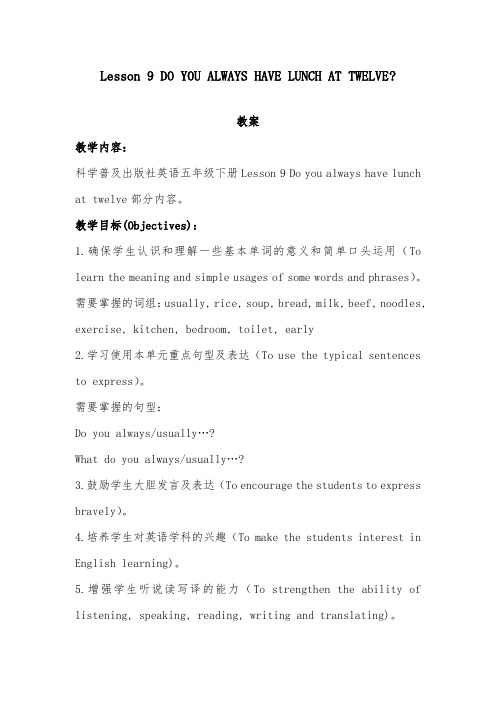
Lesson 9 DO YOU ALWAYS HAVE LUNCH AT TWELVE?教案教学内容:科学普及出版社英语五年级下册Lesson 9 Do you always have lunch at twelve部分内容。
教学目标(Objectives):1.确保学生认识和理解一些基本单词的意义和简单口头运用(To learn the meaning and simple usages of some words and phrases)。
需要掌握的词组:usually, rice, soup, bread, milk, beef, noodles, exercise, kitchen, bedroom, toilet, early2.学习使用本单元重点句型及表达(To use the typical sentences to express)。
需要掌握的句型:Do you always/usually…?What do you always/usually…?3.鼓励学生大胆发言及表达(To encourage the students to express bravely)。
4.培养学生对英语学科的兴趣(To make the students interest in English learning)。
5.增强学生听说读写译的能力(To strengthen the ability of listening, speaking, reading, writing and translating)。
教学重点(Key Points):在学习了单词的基础上,以单词为载体,进行主要句型的学习,并了解其中的语法现象,根据具体情境,学会交流对话,侧重句型语法学习,交际意向和课外拓展为重点。
教学方法:游戏,音频,情景教学法,Pair-work两人小组活动,Group-work小组活动,多媒体辅助教学。
五年级英语下册Lesson9《Doyoualwayshavelunchattwelve》 优秀课件2科普版

比比,赛赛,看谁背得你有哪些收 获想和大家分享一下?
在对话中,有三个表示频度的词, always,usually ,sometimes,如果用百 分数表示,_________表示100%, _________表示70− 90%,_ ___________表示40%。
拓展运用 talk and write, eg: Lulu,Do you usually have ...at...? What do you have for ...? Name Lu lu Tom lilei
Breakfast time Food/Drink
7:00 6:50 7:10
bread / milk egg / milk soup/ bun
Read "let's talk" on page50, 1 我是小小翻译官,轻松阅读闯难关, 读完译好请举手,比比谁能更优秀。
2 回答问题最在行,头脑先要想一想, 带着问题读两遍,时态人称两不伤。
解疑合探
• 合探提示 • (一个人的力量是有限的,大家的智慧是无穷。) • Read "let's talk"again,fill the blanks in teams • (再读对话,小组讨论合作,根据对话内容填空)
英语励志名言
• Never pet off what you can do today until tomorrow.(今日事,今日毕!) • Nothing is impossiball.(没有什么不可能。)
我们都希望自己能有一个知己,从相逢,相识,到相知,到无话不谈的知己,穷尽一生,朋友广而远,知己少而近,友情文章告诉我们,如果遇到这样一个互相懂得的人, 就要好好珍惜。自己是把剑,知己是剑鞘,利剑出鞘,锋芒毕露之时,剑鞘则系在腰间默默守候。一把剑经过一番打打杀杀,江湖缠扯过后,必会五骨通乏,六筋俱困,疲 惫充斥于脏腑之间,这个时候,就需要躺在剑鞘里好好休养了。剑鞘是一把剑最坚实的维修基地,提供最可靠地后勤保障,每当宝剑元气大伤之时,务必要返厂疗伤,作为 知己的剑鞘,定是倾其所有,哪怕是砸了老锅,卖了陈铁,也要肝胆相照,以最大功率输出自己的真气,只为保住这把剑。有人腰缠万贯,有人流落街头,有人名扬四海, 有人一生庸碌,人这一辈子,旅途虽短,路却难走。注定逃不过酸甜苦辣,悲欢离合的音速飞镖,注定要吃尽五颜六色的风霜。若能赐一知己,得之是命,惜之是福,可不 能随意糟蹋。知己就是半个自己,如果自己是左脑,那知己就是右脑,如果自己是左手,那知己就是右手,如果自己是左边的这瓣心,那知己就必须是右边的另一半。若缺 了另一半,就是个死人了,并且还死无全尸,若是挣扎着不死,无异于变异僵尸,理性失效,良心残废,吞噬人血,不带怜悯,岂不更可怕?人,是个对称的生命,什么都有 左右两半,若缺了知己,自己就只剩一半了,不就成了一头怪物了吗?那不就要天天被奥特曼追杀吗?跌倒了,很多人懂得扶你,摔伤了,很多人懂得止血,噎住了,很多人 懂得端杯水。可是,当你内心受伤了,即使是小到纳米级的伤痕,有人能看出来吗,你既没感冒,也没发烧,脸色红润,满面轻风,盖住了内心那瞬间的小小波动,可能不 会有任何震感,也许连自己都找不到震源。而这个时候,偏偏有人感觉到地震了,准确侦测出了震级和震源,只有知己才能扫描出你心房里的病毒,唯有知己才会专门为你 安装一台精密地动仪。知己能读出你心里最深处的悲伤,埋得再深,填得再厚实,也会被掘出来,而这种近乎奇迹的事只有知己才做得到。人生的轨迹既不是常数函数式的 一马平川,也不会是指数函数式的一路腾达,而是正弦曲线式的跌宕起伏,有升有降,有顶峰,有谷底,盛极必衰,摔倒了最低处,再开始爬升。而知己,就是在我们直线 飙升时给我们及时降温,以免过热烧坏了头脑,主机一旦报废了,整台机器随之瘫痪;在我们堕落腐朽时给我们添加柴火,用木棒在雪花缤纷的寒冬里,擦出希望的火花,给 我们解冻,帮我们去潮,重新启动。根据牛顿力学定律,力的作用是相互的,人也是这样,知己是自己的知己,那自己就是知己的知己,互为知己,才是真正的知己。若仅 有单方面的输出,另一方却浑然不知,只能说明,一方作践自己,另一方没心没肺。一个不会珍惜自己,另一个不会珍惜别人,作为知己的这两半,都没有得到精心照顾, 土壤干裂,缺水少肥,杂草丛生,怎么指望这两半茁壮成长呢,将来不是畸形就是异形,怎么能做知己呢?人心不在大小,而在于单人间和双人间的纠葛,纵使心再大,可就 住了你一个人,不觉得空虚寂寞冷吗,就算心再小,可也住下了两个人,那份互为知己的温暖,连上帝都会羡慕的。朋友大薇去北京出差,约了十几年没见的朋友吃饭,大 薇在城东,朋友在城西,两个人耽搁在路上的时间,比见面聊天的时间还长。匆匆吃饭,匆匆告别,大薇苦笑着说,曾经好得睡一个被窝,说要好一辈子的闺蜜,生生被时 间隔在了两岸,再也回不去。每个人都是这样的吧,一路走来,人生的每个阶段,总会有那么几个死党或闺蜜,和你一起疯,一起闹,一起哭,一起笑,在你孤单时给你温 暖,在你受伤时给你安慰,在你受欺负时,为你出头……走着走着,在某个人生的转角说了再见,然后就再也没见到;即使再见,也因为时过境迁,找不到来时的路,无法 再走近。就像席慕蓉说的:回顾所来径,只剩苍苍横着的翠微。只有少数人,会陪你一生。坦然面对友情的得到与失去,不必追,不必挽留,这才是人生常态。人生漫长, 总有一些人来来去去,总有一些人要离去; 也总有一些人,无论风风雨雨,会陪你一辈子。电影《七月与安生》里的七月与安生,是两个截然不同的少女。七月文静乖巧, 有个幸福温暖的家庭,是大家眼里的好孩子;安生叛逆桀骜,父亲去世母女相爱相杀,是个缺爱的女孩。偏偏两个人好得要命,彼此踩着对方的影子,恨不能一辈子在一起, 一起洗澡,一起翘课……15岁那年,她们都喜欢了一个男孩子家明。家明的出现,让七月和安生之间的情感发生了不可言喻的变化,而家明的摇摆不定,也让两个女孩面对 友情与爱情,备受煎熬。最终,安生在确认自己也爱上家明以后,选择把家明让给七月,自己离开小镇,去流浪。她说,在七月与家明之间,她选择七月。七月明白安生的 离开,是成全,但还是任由安生的列车徐徐驶离,爱情在某个时刻,会战胜友情。但是,分开的两个人,仍然彼此牵挂。七月羡慕安生的自由,安生羡慕七月的岁月静好。 再次见面,却又像刺猬一样彼此伤害,然后各自哭泣疗伤。电影结尾,七月难产去世,临终前,将孩子托付给安生。不管我们之间有多少误会和伤害,我还是选择最信任你, 把孩子托付给你。这也许就是最动人的友情。想起《乱世佳人》里梅兰妮和斯嘉丽。一个相貌平平,但是优雅得体、善解人意的贵族小姐,女人中的女人;一个妩媚动人, 任性倔强热情似火的庄园主女儿,女人中的男人。一开始,斯嘉丽便把梅兰妮当作情敌,认为是梅兰妮夺走了自己暗恋的阿希礼。 所以,她心怀嫉恨,处处刁难,把梅兰妮 当作眼中钉。然而,随着美国南北战争的爆发,家园被毁,两个性格截然不同的女性,不得不相依为命。郝思嘉勇敢强韧,为了养活一家人,复兴家业,忍受各种屈辱,冒 着各种危险,梅兰妮则在一边贴心陪伴,护着她,开导她,看着她一天天褪去浮华与虚荣,她们的友情也开始萌芽。哪怕自己的丈夫和郝思嘉的绯闻传得满城风雨,哪怕郝 思嘉的名声在上流社会差到了极点,她都挺身而出,帮她解围。所以,当梅兰妮难产需要照顾,连她的姑妈都抛下她逃跑的危急时刻,斯嘉丽不离不弃,克服内心的恐惧, 照顾她顺利产下儿子小博。如果说这个时候,斯嘉丽还有是为了阿希礼的托付,但是,当她带着一家人逃回被毁的家园,枪杀闯入家园的“北方佬”,胆小如兔的梅兰妮却 勇敢地帮着她处理尸体的那一刻,她们的友谊完成了升华。就像梅兰妮说的那样,她一直羡慕斯嘉丽旺盛的生命力和坚强勇敢的性格。但其实,斯嘉丽也羡慕梅兰妮那种成 熟,识大体,包容的胸怀吧。两个本来是情敌的人,在战争的灾难中,相互取暖,结成了深厚的友情。梅兰妮临死前,把儿子托付了斯嘉丽照顾,并嘱咐她珍惜巴特勒的爱。 梅兰妮比斯嘉丽自己还了解她,她了解她的缺点和不完美,更了解她的能力与骨子里善良,所以,她把儿子托付给她。最好的友情,就是这样吧,你有种种缺点,我还是喜 欢你,信任你,地老天荒。不只女人,男人之间也有这样动人的友情。魏晋时候,同为竹林七贤的嵇康与山涛,是好朋友,他们同另外五个人一起,啸饮山林,自在快活。 但是后来山涛禁不住曹魏朝廷的再三邀请,去做官了,而且很快做到了组织部长的位置。当时曹魏朝廷广揽天下名士,山涛便向朝廷举荐了自己及的好友嵇康。不料,嵇康 勃然大怒,他怎么肯给抢了汉室天下的曹家卖命呢!越想越气,于是写下了那个着名的《与山巨源绝交书》。大概就是说,本来还以为你了解我,原来不是这样,这样的朋 友不要也罢了。山涛也没说啥,还在皇帝面前极力维护,两人的友谊也仿佛到此结束。后来,你去投奔山涛叔叔吧,他肯定会好好照顾你的。果然山涛视其子如己出,亲自 授业解惑,呕心沥血把这个孩子培养成人,引入仕途。对此,史学家说法不一,有的认为嵇康写信是在玩无间道,有的认为山涛对嵇康的死有一定责任并心存愧意。而我, 看到的是友情最好的诠释:两个人志趣相异,选择不同的道路,而这一切却丝毫没有伤害到他们之间的信任。
五年级下英语教案-Lesson9It'ssixforty-five-科普版
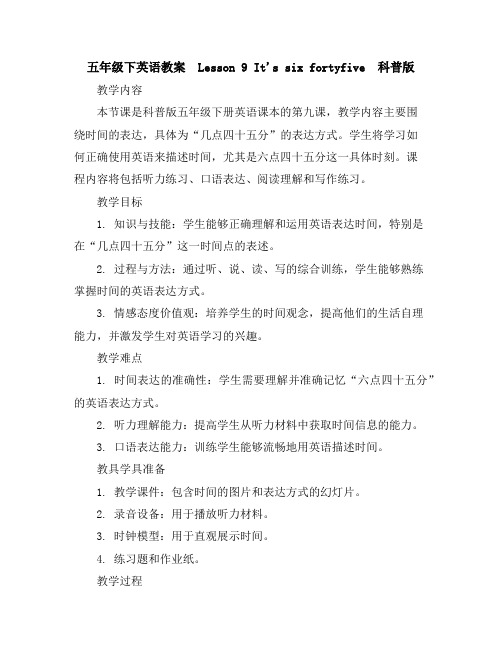
五年级下英语教案 Lesson 9 It's six fortyfive 科普版教学内容本节课是科普版五年级下册英语课本的第九课,教学内容主要围绕时间的表达,具体为“几点四十五分”的表达方式。
学生将学习如何正确使用英语来描述时间,尤其是六点四十五分这一具体时刻。
课程内容将包括听力练习、口语表达、阅读理解和写作练习。
教学目标1. 知识与技能:学生能够正确理解和运用英语表达时间,特别是在“几点四十五分”这一时间点的表述。
2. 过程与方法:通过听、说、读、写的综合训练,学生能够熟练掌握时间的英语表达方式。
3. 情感态度价值观:培养学生的时间观念,提高他们的生活自理能力,并激发学生对英语学习的兴趣。
教学难点1. 时间表达的准确性:学生需要理解并准确记忆“六点四十五分”的英语表达方式。
2. 听力理解能力:提高学生从听力材料中获取时间信息的能力。
3. 口语表达能力:训练学生能够流畅地用英语描述时间。
教具学具准备1. 教学课件:包含时间的图片和表达方式的幻灯片。
2. 录音设备:用于播放听力材料。
3. 时钟模型:用于直观展示时间。
4. 练习题和作业纸。
教学过程1. 导入:通过展示时钟模型,复习之前学过的时间表达方式,引起学生对时间概念的关注。
2. 新课内容讲解:介绍“六点四十五分”的英语表达方式,并通过课件示例进行讲解。
3. 听力训练:播放包含时间信息的听力材料,让学生听并尝试理解材料中的时间点。
4. 口语练习:组织学生进行角色扮演,模拟实际场景,用英语询问和回答时间。
5. 阅读理解:提供包含时间描述的短文,让学生阅读并提取关键时间信息。
6. 写作练习:指导学生书写关于时间的小段落,巩固书面表达能力。
板书设计板书将简洁明了地展示本节课的核心内容,包括时间的英语表达方式、重要短语和句型。
通过图表和颜色对比,突出“六点四十五分”的表达方式。
作业设计1. 听力练习:听一段关于时间安排的对话,记录下对话中的时间点。
五年级英语下册Lesson9《Doyoualwayshavelunchattwelve》 优秀课件2科普版

Do you always have lunch at twelve?
(Let's talk)
warmer
• 英文儿歌律动: • If you are happy
设疑自叹
• 看图质疑 • look at the pictures ,ask some questions
自探提示
比比,赛赛,看谁背得快?
质疑再探
• 愉快的一节课已过了一大半,你有哪些收 获想和大家分享一下?
在对话中,有三个表示频度的词, always,usually ,sometimes,如果用百 分数表示,_________表示100%, _________表示70− 90%,_ ___________表示40%。
• look at the clock ,what time is it now?It's _____ .It's time for ____ .Does Lulu ___ have lunch at twelve?Yes, ____ _____ . • What about Tom ?He _____ has lunch at _______ . __________ he has lunch at12:00.What does he usually have lunch? _______,________ and _______ .
Read "let's talk" on page50, 1 我是小小翻译官,轻松阅读闯难关, 读完译好请举手,比比谁能更优秀。
2 回答问题最在行,头脑先要想一想, 带着问题读两遍,时态人称两不伤。
ቤተ መጻሕፍቲ ባይዱ
解疑合探
• 合探提示 • (一个人的力量是有限的,大家的智慧是无穷。) • Read "let's talk"again,fill the blanks in teams • (再读对话,小组讨论合作,根据对话内容填空)
[优质]小学英语科普版五年级下册Lesson9Doyoualwayshavelu
![[优质]小学英语科普版五年级下册Lesson9Doyoualwayshavelu](https://img.taocdn.com/s3/m/c47c28639a6648d7c1c708a1284ac850ad0204e2.png)
[优质]小学英语科普版五年级下册
Lesson9Doyoualwayshavelu
Leon9Doyoualwayhavelunchattwelve
第一课时
教学内容1.word2.Let’learn3.Akandanwer教学目标
1.学会3个词汇:alwayuuallyriceearly等
2.了解字母组合ar发音规律。
3.能听懂、会说、会拼读单词,能根据中文拼写出英文。
4.会询问钟点的问法及答语并能用来交际。
教学重点
本课单词的拼读,熟读Let’learn.教学难点
翻译句子:Doyoualwayhavelunchattwelve教学模式
引、探、练、展
教学准备
单词、卡片、录音机教学过程
Step1复习引入(引)hortdialogue.(师生对话)
通过师生之间简单的问候,让学生立刻融入到学英语的氛围中,加强了师生之间的亲和力。
Step2新课
1.Showthetitle(揭示课题)
2.出示单词卡片:alwayuuallyriceearly师领读后生说出汉语意思。
3.再出示单词卡片的背面:妻子、小时、努力、硬的,让学生说出英语。
4.复习语音:ar常发[a:]读单词tar,party,car,farm,
park.Step3学习Let’learn(探)
1.师出示第一幅图。
师提问:Doyoualwayhavelunchattwelve生答:Ye,Ido
----DoyoualwayhavelunchattwelveYe,Ido
练习:逐一出示图或板书出:
“7:10chool”“12:00lunch”“6:00upper”学生试着仿照例句练习。
科普版英语五下Book5BLesson9-4课件(公开课)
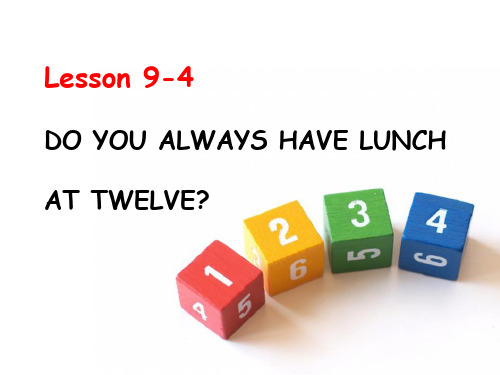
Let’s learn
Practice s
Game
— What does she/he do ? — She/He is a … — Where does she/he work? — She/He …
Practices
1 Let’s learn
2 Sentence structures: What do you dIoa?m a worker? Where do you work? I work in a factory.
Lesson 9-4
DO YOU ALWAYS HAVE LUNCH AT TWELVE?
Revision
Revision
— Do you always have … at… ? — Yes, I do./No, I don’t. — What do you usually have for …? — I usually have …
Listen and choose B A A B A
Talk and writeRLeabharlann ad choose and say
A: I’m doing a survey. Can I ask you some questions? B: Oh, yes. A: (Are/Do) you from the USA? B: Yes, I (am/do). A: What food (are/do) you often have? B: We often have hamburgers. A: (Are/Do) you usually drink tea? B: No, we (aren’t/don’t). We usually drink coke. A: Thank you. B: You’re welcome.
- 1、下载文档前请自行甄别文档内容的完整性,平台不提供额外的编辑、内容补充、找答案等附加服务。
- 2、"仅部分预览"的文档,不可在线预览部分如存在完整性等问题,可反馈申请退款(可完整预览的文档不适用该条件!)。
- 3、如文档侵犯您的权益,请联系客服反馈,我们会尽快为您处理(人工客服工作时间:9:00-18:30)。
Lesson 9 Do you always have lunch at twelve?
第一课时
教学内容
1. words
2. Let’s learn
3. Ask and answer
教学目标
1. 学会3个词汇:alwaysusuallyriceearly等
2. 了解字母组合ar发音规律。
3. 能听懂、会说、会拼读单词,能根据中文拼写出英文。
4. 会询问钟点的问法及答语并能用来交际。
教学重点
本课单词的拼读,熟读Let’s learn.
教学难点
翻译句子:Do you always have lunch at twelve?
教学模式
引、探、练、展
教学准备
单词、卡片、录音机
教学过程
Step1 复习引入(引)
short dialogue.
(师生对话)
通过师生之间简单的问候,让学生立刻融入到学英语的氛围中,加强了师生之间的亲和力。
Step2 新课
1. Show the title(揭示课题)
2. 出示单词卡片:alwaysusuallyriceearly师领读后生说出汉语意思。
3. 再出示单词卡片的背面:妻子、小时、努力、硬的,让学生说出英语。
4. 复习语音:ar常发[a:]读单词star,party,car,farm,park. Step3 学习 Let’s learn(探)
1. 师出示第一幅图。
师提问:Do you always have lunch at twelve?
生答:Yes,I do
----Do you always have lunch at twelve?
⏹Yes,I do
⏹练习:逐一出示图或板书出:“7:10 school” “12:00
lunch”“6:00 supper”
学生试着仿照例句练习。
练习完毕后,分别叫几组学生站起来对话,互问互答。
Step4 学习Ask and answer(练)
把全班分成两组,然后变换多种方式进行问答直到灵活熟练为止。
生1拿表问Do you always have lunch at twelve?
:
生2回答:Yes,I do.What about you?
生3拿表问What do you usually have for lunch?:
生4回答Rice.
Step5 总结并拓展(展)
总结黑板上的重点知识,学生做笔记并识记。
板书设计
Lesson 9 Do you always have lunch at twelve?
:Do you always have lunch at twelve?
Yes,I do
教学反思
第二课时
教学内容
Let’s talk and Let’s chant
教学目标
会询问钟点的问法及答语并能用来交际。
教学重点Do you always have lunch at twelve?
.
教学难点
“一个半小时”与“一个小时”用英语的表达方法。
教学模式
引、探、练、展
教学准备
录音机、彩色粉笔
教学过程
Step1 复习引入(引)
复习单词:alwaysusuallyriceearly 1. 老师出示单词卡片,学生说出中文意思。
2. 师领读一遍单词。
Step2 学习新课(探)
1. 引导学生说出课题含义。
2. 听录音,熟悉课文。
认真听新单词的发音。
3. 老师领读,让学生看清口型,学生跟读。
4. 再次听录音,然后请同学们先读一遍,猜测对话内容。
5. 老师朗读对话。
6. 引导同学们自己对对话内容进行翻译。
7. 听录音,学生跟读,纠正发音。
--Do you always have lunch at twelve?
---Yes,I do.What about you?
----*What do you usually have for lunch?
---- Rice.
Step3 学习Let’s chant(练)
Tick, tock, tick, tock.
It’s time for dinner.
It’s time for supper.
So it sings through all the day.
Tick, tock, tick, tock.
Merrily sings the clock.
让学生听录音,了解一日三餐中的晚餐的英文表达是supper.重点句型是It’s time forsth.. 该做…了。
Step4 (展)
老师强调时间的英文表达:少于30分钟可用past.例如:a quarter past seven 7:15
多于30分钟可用to 例如:
a quarter to seven 6:45
差一刻到7:00
Step5 作业
读Let’s talk的内容
板书设计
Lesson 9 Do you always have lunch at twelve?
--Do you always have lunch at twelve?
---Yes,I do.What about you?
----What do you usually have for lunch?
---- Rice.
教学反思
第三课时
教学内容
Read
教学目标
理解课文大意,能根据图片及关键词进行复述,并能回答与课文内容相关的问题。
教学重点
钟点、三餐、星期几的表述。
教学难点
“一个半小时”与“半个小时”用英语的表示方法。
教学过程
Step1 (引)
复习检查
复习Let’s learn,教师出示卡片,请每组同桌互译。
Step2 (探)
1. 预习Read,独立翻译。
2. 请一名同学翻译,其他同学对照自己的翻译是否一样。
3. 其他同学补充。
4. 提问学生用中文讲这个故事。
5. 播放录音,学生边听边对照书中人物默读。
6. 教师板书出星期、时间、三餐的表示法:
It’s Sunday.
It’s eleven fifty.
It’s time for lunch.
7. 学生练读。
区分“half an hour半小时”和“one and a half hours一个半小时”
8. 板书课文中的关键词,教师带领学生一起复述。
Step3 (练)
根据音标写单词:
[waif] [ha:d] [pik] [sta:]
连线:
What time is it? 7:30
It’s five-ten.
What time is it? 1:20
It’s seven-thirty.
What time is it? 5:10
It’s one twenty.
板书设计
Lesson 9 IS HE LATE
--Do you always have lunch at twelve? ---Yes,I do.What about you?
----What do you usually have for lunch? ---- Rice.
教学反思。
